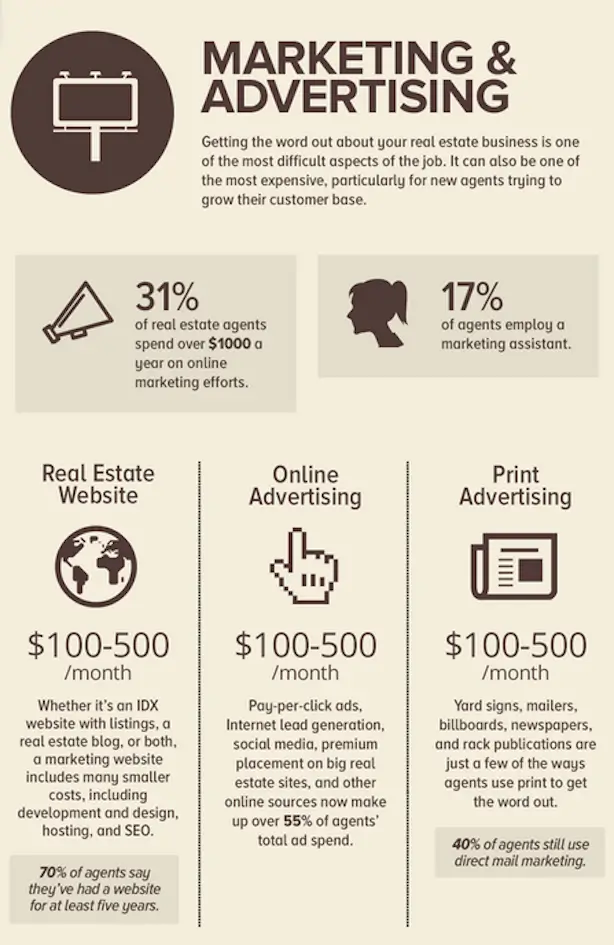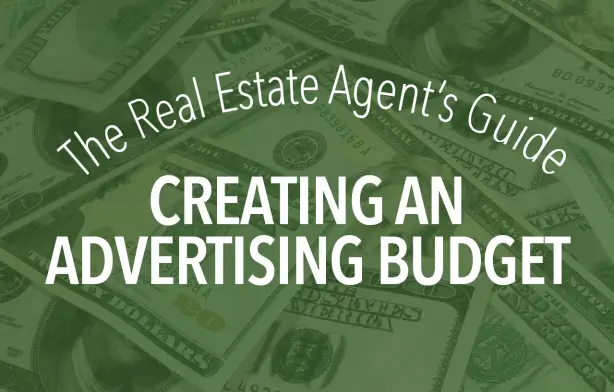Before spending a single dime on your paid online real estate marketing strategy, you have to determine exactly how much of an advertising budget you actually have. Spending too much or too little on tactics like pay per click (PPC) and social media ads will only hurt your business. You need to know what you can afford to spend, but also the amount you need to spend to meet your sales goals.
It’s been proven time and time again by countless agents, brokers, and other professionals that paid advertising can pay off. Predictive analysis firm Kenshoo reports the click-through rate on paid ads in the U.S. reached 2.2% during the first quarter of 2014 — nearly a third higher than the rate a year earlier. To see these kinds of figures with your paid ads, you must develop a budget that works for you … and the only way to determine this is to know what factors affect your budget.
Factors to Consider in Your Real Estate Advertising Budget
Your Recent Sales History
It’s not simply enough to look at what’s in your bank account to determine how much you should spend. As a thoughtful marketer, you want to align your marketing budget with your sales goals. Not enough marketing = not enough sales. Not enough sales = not enough income. There are a few ways to identify the right ad spend for you.
First up is your sales records. Look into your real estate past to see what returns you had on closed deals. Data from the past year, if available that far back, can be the most useful when figuring out what you can afford to spend on marketing. Even just a few months worth of sales records can help inform your decision-making. Be sure to examine these details closely:
- The final sale price on homes you sold
- Your average commission from these deals
- The total number of transactions conducted
One thing to remember when analyzing your sales records: If you closed an abnormally high number of deals last year, that may not be indicative of future trends. Similarly, if you had an off year during the previous 12-month period, that may not point to continually slow conditions. Find your average sales total for each month and quarter and you’ll have a good idea of what you can expect throughout the coming year.
Once you’ve accounted for such irregularities, look at the top-line numbers. How much, in total, did you spend on marketing? And, how much, in total, did you earn from commissions? While you can’t guarantee that spending the exact same amount will result in the exact same earnings, it’s a pretty good bet that spending much less won’t help your income, while spending more should boost your income.
Local Real Estate Conditions
In addition to your past sales, expert market forecasts should also be taken into account when budgeting. Aside from relying on major organizations and agencies to provide you with statistical trends, data, and analysis about the housing market, consult local groups and experts as well to see what your community’s conditions are expected to look like in the months ahead. Contact those who closely study your market, like your state or regional Realtor organization, and ask for any reports about the area housing market. Data points related to home sales, prices, and construction, along with economic conditions, like unemployment and business growth, are the ones to know.
It may be counter-intuitive, but a slow market typically means you need to increase your marketing spend in order to generate the same number of sales. Even though there are fewer transactions, there’ll still be just as many agents competing for that business, so you’ll need to do more to meet your sales goals.
Industry Averages for Ad Spend
Knowing what the averages are for real estate agents when it comes to ad spend can also aid your budget creation. Yes, budgets for some agents may far exceed what you can spend on yours. However, you can still identify how much money is typically spent on ads from these statistics.
For instance, data from the National Association of Realtors reveals the average Realtor spent $128 on paid advertising and $78 on search engine optimization (SEO), blogging, and social media marketing per month in 2012. Bureau of Labor Statistics data shows agents made a median $42,000 that year.
How much you put toward advertising depends entirely on how much you feel comfortable with, but knowing figures like these can give you a basis for comparison when budgeting.
Here are some additional ad spend figures from our infographic The Cost of Being a Real Estate Agent that can give you a glimpse into what the average agent spends on their online and offline paid advertising:

Fellow Real Estate Agents and Brokers
Another factor to consider in setting your budget is what fellow colleagues are spending on their marketing. Contact any agents in your personal network who you feel can offer insight into how to structure your budget. Try to get specific dollar figures from them if possible and learn from their past budgeting mistakes. For example, if they over- or under-allocated, or put some of their budget toward marketing tactics that didn’t pan out, you’ll get an idea of what to do and not to do with your ad dollars.
Also, if you work at a brokerage, see if someone there is willing to help you find some data about marketing budgets used by current or past agents. Brokers want to see their agents succeed, so simply ask yours if they have records for the communities and price ranges you work with most often.
Typical Paid Advertising Costs
Once you’ve closely looked over these factors, it’s finally time to take a look at what specific paid advertising types will best fit your real estate marketing plans.
If you’re looking to have a greater presence on social media, you could look into ads on Facebook. If PPC is something you’re interested in, learn the basics of setting up AdWords. You can even create some display ads, like banners, to increase brand awareness and get clicks to your real estate website.
Whichever avenue you choose, be sure to analyze the ad type’s feasibility both financially and functionally. Put more simply? Make sure you have enough money to advertise on the platform of choice, but also know how to maximize your ads.
Making the most of your ad dollars means closely tracking which ads work well for you, discovering what made them successful, and using that data to make them even better.
Regardless of how much you spend on real estate advertising, you’ll only see success by frequently analyzing your metrics.






